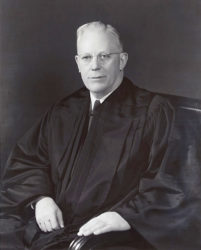Chief Justice Earl Warren, Opinion of the Court Brown v Board of Education of Topeka (May 17, 1954)
This unanimous decision ruled that racial segregation of public schools is unconstitutional, overturning the “separate but equal” doctrine established in Plessy v. Ferguson in 1896. The decision stated that
“separate educational facilities are inherently unequal.”

Undated photo of Earl Warren, 14th Chief Justice of the United States
“In the instant cases … there are findings below that the Negro and white schools involved have been equalized, or are being equalized, with respect to buildings, curricula, qualifications and salaries of teachers, and other “tangible” factors. Our decision, therefore, cannot turn on merely a comparison of these tangible factors in the Negro and white schools involved in each of the cases. We must look instead to the effect of segregation itself on public education.
In approaching this problem, we cannot turn the clock back to 1868, when the Amendment was adopted, or even to 1896, when Plessy v. Ferguson was written. We must consider public education in the light of its full development and its present place in American life throughout the Nation. Only in this way can it be determined if segregation in public schools deprives these plaintiffs of the equal protection of the laws.”
Source and Excerpts of decisions on Brown v Board of Education cases. Teaching American History